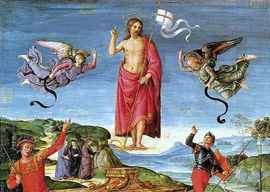
April 07, 2012

Resurrection of Christ by Rafael
Jesus’s biographies were passed down through an oral tradition for decades before they were put down on parchment. Each of these four accounts was used by separate Christian communities which held dramatically different ideas about who Jesus was and what his death and resurrection meant. This created ample opportunity for permutations in the story before they were gradually wedded into an orthodox canon.
From beginning to end, the Book of John bears little resemblance to the other three Gospels, which in turn show subtle variations between each other. John is the only Gospel that refers to Jesus as the Lamb of God, emphasizing his “glorification” on the cross as a sacrificial act. By having Jesus crucified on the day of Preparation”while the lambs were being killed at the temple”the author implies that Jesus was a cosmic substitution for animal sacrifice. Just as the lambs’ blood protected the Hebrews during the first Passover in Egypt, so does Jesus’s blood save each believer from eternal death. It appears that the author”or the author’s oral source”was willing to alter the details in order to make this connection. All of the Gospel writers bend Jesus’s story to fit their own perspectives. It’s called selective memory.
Fundamentalists never address these glaring discrepancies. They cling to biblical inerrancy as though the universe would collapse into the vacuum of reasoned inquiry if they started asking questions. This wouldn’t bother me if it weren’t for their evangelical mandate to badger the rest of us with holy-rolling enthusiasm. Even that wouldn’t be so bad if they would actually read their Bibles.
Fundamentalists tend to ignore everything in the “inerrant” scripture besides a few choice passages such as the “literal” creation story in Genesis, the assurance that only Christians go to heaven (“I am the way, and the truth, and the life. No one comes to the Father except through me”), or the simple formula for getting there (“…whosoever believes in him shall not perish but have everlasting life”). Any wiggle room for metaphorical interpretation is immediately crushed by their classic conversation-stopper at the dinner table: “God does not make mistakes.” That’s when I mention how delicious the bean casserole is and hope they’ll let me go to hell in peace.
Don’t get me wrong: I would much rather share a property line with Christians than with hypersensitive Muslims or chicken-gutting witch doctors. But fundamentalists really take the fun out of biblical discussions for me. Are they trying to ruin a literary masterpiece?
The first time I read the Gospels in their entirety was over a decade ago, when I was hitchhiking around the West Coast. I only packed one book, Lao Tzu’s Tao Te Ching, which I read on the way. I found myself at a Rainbow Gathering in Montana, and as I sat in that field watching stinky hippies warp their brains, shed their clothes, and jiggle around hypnotic drum circles, some random guy handed me a pocket New Testament opened to 1 Corinthians 13.
I eventually flipped to the Gospels, where I found a welcome counterbalance to the decadence around me and a salve for the cancerous fury in my heart. I read every word as I bummed rides down the coast. I have read them many times since. Jesus’s and Lao Tzu’s parallel teachings”their counsel to avoid pretense and empty rituals; to remain calm in the face of adversity and cultivate empathy for your enemies; to moderate pleasure and detach from material wealth; to maintain the mind of a child”slowly opened a profound dimension within an otherwise animalistic existence.
A taste of wisdom does not turn a fool into a sage, but at least I’m not a completely selfish bastard anymore.
As for the nagging differences between the Tao Te Ching and the Gospels, I approach them in the same way that I do the multitude of contradictions within the Bible as a whole or the apparent discrepancies between all holy books and hard science. I absorb what I can with an open mind and weigh it against my reason and experience. These are ancient riddles to which there may be no ultimate solution. No one is comforted by ambiguity, but without the anchor of rigid dogma, that’s all we have.
In one scene peculiar to the Book of John, Pilate asks Jesus, “What is truth?”
Jesus never answers.